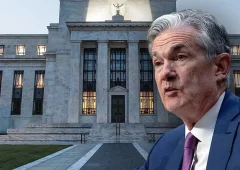Donald Trump Blames Biden Administration for Recent Market Crash
06.08.2024 10:30 1 min. read Alexander StefanovFinancial markets are in chaos, with Donald Trump attributing the crash to Kamala Harris and the Biden administration.
Over $2 trillion vanished from traditional markets within the first trading hour, and the crypto sector is experiencing extreme turbulence reminiscent of 2021.
Online brokerages like Charles Schwab, Fidelity, and Vanguard faced technical issues, impacting thousands of users. Bitcoin has dropped over 16%, and Ether has seen its sharpest decline since 2021.
Massive sell-offs have resulted in the liquidation of 305,759 traders, amounting to $1.22 billion, dragging Bitcoin below $50,000.
On Truth Social, Trump blamed the market collapse on Harris and Biden, claiming their inept leadership caused the crisis. He presented voters with a stark choice: return to “Trump prosperity” or face the “Kamala Crash” and a potential Great Depression in 2024, along with the threat of World War III.
As tensions rise in the Middle East, fears of a larger conflict are spreading on social media, with frequent advisories contributing to global market instability. Traders are grappling with an atmosphere of escalating uncertainty and rumors of war.
-
1
Polygon Breaks from Decentralization as Sandeep Nailwal Assumes Full Control
11.06.2025 20:00 2 min. read -
2
Nvidia CEO Urges UK to Invest in AI Infrastructure or Risk Falling Behind
10.06.2025 9:00 1 min. read -
3
KuCoin Plants Its Flag in Bangkok With a Licensed Thai Exchange
14.06.2025 13:00 1 min. read -
4
Why Gold Could Be the Smart Play Amidst US Debt Surge
11.06.2025 11:00 1 min. read -
5
Warren Buffett Narrows His Bets as He Prepares to Step Down
14.06.2025 16:00 2 min. read
Coinbase Surges 43% in June, Tops S&P 500 After Regulatory Wins and Partnerships
Coinbase has emerged as the best-performing stock in the S&P 500 for June, climbing 43% amid a surge of bullish momentum driven by regulatory clarity, product innovation, and deeper institutional interest in crypto.
What Brian Armstrong’s New Stats Reveal About Institutional Crypto Growth
Coinbase CEO Brian Armstrong has spotlighted a significant acceleration in institutional crypto adoption, driven largely by the surging popularity of exchange-traded funds and increased use of Coinbase Prime among major corporations.
Whales Buy the Dip as Retail Panics: This Week in Crypto
The latest market turbulence, fueled by geopolitical tensions and investor fear, offered a textbook case of how sentiment swings and whale behavior shape crypto price action.
What Will Happen With the Stock Market if Trump Reshapes the Fed?
Jefferies chief market strategist David Zervos believes an upcoming power shift at the Federal Reserve could benefit U.S. equity markets.
-
1
Polygon Breaks from Decentralization as Sandeep Nailwal Assumes Full Control
11.06.2025 20:00 2 min. read -
2
Nvidia CEO Urges UK to Invest in AI Infrastructure or Risk Falling Behind
10.06.2025 9:00 1 min. read -
3
KuCoin Plants Its Flag in Bangkok With a Licensed Thai Exchange
14.06.2025 13:00 1 min. read -
4
Why Gold Could Be the Smart Play Amidst US Debt Surge
11.06.2025 11:00 1 min. read -
5
Warren Buffett Narrows His Bets as He Prepares to Step Down
14.06.2025 16:00 2 min. read


